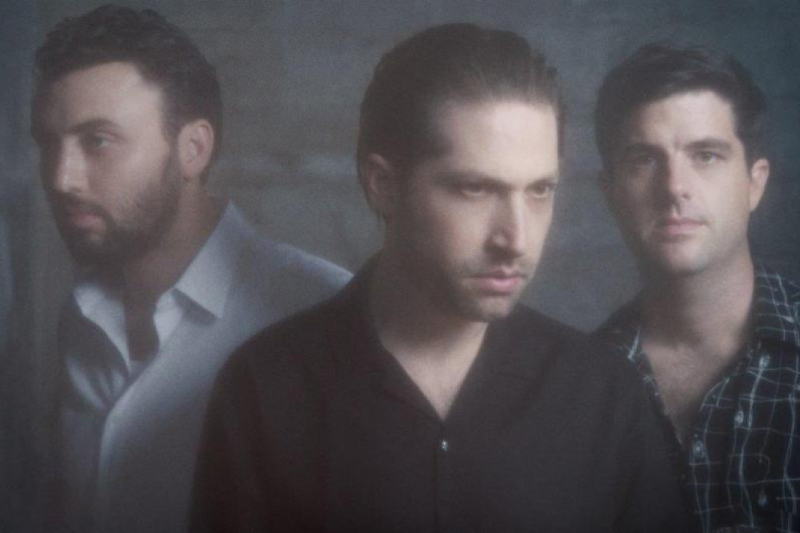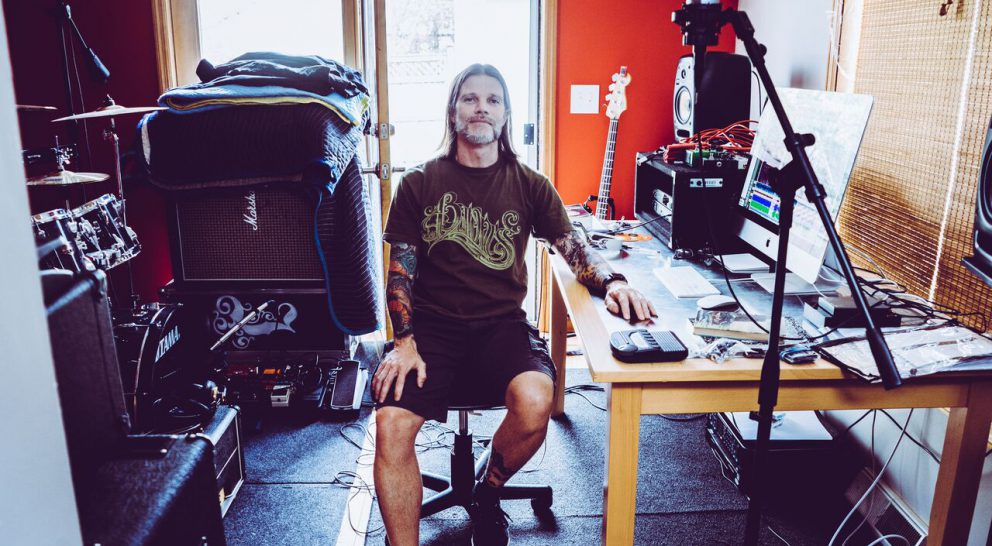Photo: Brian Tamborello and Lo Nguyen
Mini Mansions has been on tour for quite a while, and they have a long way to go yet. In between their support tour with Queens of the Stone Age and recent headlining tour, the band released the four-track EP Works Every Time. Soon they’ll be heading back to the states for their North American tour, playing The Hollow in Albany on June 4 and releasing a new full-length album Guy Walks Into A Bar… on July 26.
Band leader Michael “Mikey Shoes” Shuman recently hopped off of soundcheck for a show on their UK leg of tour to talk about Mini Mansions’ July release and how writing this album pushed him to ditch an impenetrable rockstar persona and find power in vulnerability.
The Collaborative: Between dropping the Works Every Time EP last fall and having the album coming up this summer, how did that fit between all of your touring, as well as the stint with Queens? Was the EP sort of a jumping off point for where you wanted the album to go?
Michael Shuman: We actually made the album before the EP. It had been done for a while and in between all of our other touring we wanted to put some music out before the record and we knew we had a lot of time. So we had some extra songs and we kinda were in a weird funk as far as interpersonal band stuff so we thought this would be a good opportunity to come together in the studio and do something fresh.
CO: I know you’ve talked a lot about how the subject matter is pretty heavy for you. It covers relationship turmoil and the really vulnerable aspects of that–all very personal. What is it like to hash that out over so many projects, shows and interviews?
MS: It’s been actually super liberating and cathartic. It was hard making it because we were making the record in real time. I started writing the first couple of songs when I was kind of falling in love with this woman and as we were writing, unfortunately, that relationship fell apart and so the latter part of that record has that subject matter in it. So the record making process was really interesting, I had never done it that way. It’s cool because it was all just flowing out of me. I didn’t have to think or go back to demos from prior, it was all happening in that moment, which I really loved. Now that the relationship is over and we’re on tour and I have to talk about it a lot, it’s just been liberating because I really don’t care anymore.
As a person, I’ve always been really guarded, especially in interviews. I’ve kept this mask, this persona up. This record kind of broke down those walls and helped me talk about it all, open and candid.
CO: In comparison to writing about relationships that were over before you started writing, how does it compare to have something that’s happening, or unraveling, as you’re putting an album together?
MS: In the past, I’d write songs that were retrospective, or a lot of songs not about love. This was a brand new experience for me. It was kind of cool because we started sequencing the record and we kind of came to this realization that the record title came out of that while we were making it whereas, usually, it’s at the end. We focus on putting all of those songs together somehow to make the best record possible and then come up with the title. This, we already knew what would happen. The narrative was already there.
CO: So where does the album name come into play in that process?
MS: So, when I first brought it up it was kind of a joke—which, it is a joke. But it was like, ‘What is first thing that all of us humans kind of do to go find a partner or friends?’ In this case it’s romantic and, besides dating apps, you go out. You go to a bar or meet up with friends, you put yourself out there. It just kind of came to me as: This is the first step. It could have been the first lyric on the record basically.
CO: How do you think you’ve developed as a songwriter in making this record?
MS: I think I’ve finally accepted that it’s OK to be totally honest with yourself and the world and your fans. Because I was so emotionally and mentally overwhelmed I had no choice but to take what I was feeling and put it on paper, on recording. Before this I had the time to think about how cool I wanted to sound, how I wanted people to perceive me. This time I just didn’t care. I needed to get them out and that’s how it had to be. I think I’m forever changed by that learning experience.
Playing these songs live, we’re connecting to the audience in a way that we never have and I think that’s because of the lyrical content. As a fan of music, and I like some abstract, weird shit, but I realized that all my favorite songs are pretty much simple love songs, really. There’s not much to it. I just realized, ‘Why aren’t we doing that too, if that’s what we love?’ It seems to be a pretty good formula.
CO: So band-wise, each of you come from pretty notable bands respectively (Queens of the Stone Age, The Last Shadow Puppets) but you’ve been playing as Mini Mansions for several years now. Is there an expectation that your audience is mostly coming to see “Mikey Shoes from Queens of the Stone Age” or do you think you guys have pulled ahead of that at this point?
MS: We’ve kind of always been willing to call ourselves the best support band in the world. Now we have our own Mini Mansions fans—and now we’re doing our own headlining tours, currently. We’re starting to see more people who aren’t just here to see Queens of the Stone Age and Last Shadow Puppets but we appreciate those people too and we don’t want to turn them away, people who just came to see us guys and maybe had never even heard of the band. But we welcome everybody.
CO: As a multi-instrumentalist and a songwriter, are there sounds or new styles you’ve been exploring lately you feel you haven’t gotten the chance to play with before, or grow from over the course of your music career?
MS: This is the first record where we’ve had a real, dedicated drummer and a real drum kit. Previously I’ve been the drummer and I only played a four-tom and a snare so that really expanded the sonic capabilities that we’ve had, as well as the technical capabilities. There are things that Jon Theodore, who plays drums for us now—he’s the best drummer in the world—can do things I, technically, just could not do. So if I’m like, ‘I want a crazy fill during this part,’ we can do that. This record also has way more guitar because I didn’t have to play drums so I really got to focus. For recording there’s no rules, so I ended up playing a lot of different things.
CO: In the midst of all this you’ve also found the time to score film as well, with “Feed” in 2017. How do you find the creative headspace to go between thinking as a songwriter, instrumentalist, composer and collaborator? Do you need constant stimulation when it comes to making music?
MS: Unfortunately, no. I spent so much time when I was younger—I couldn’t get enough of music—being a heavy record collector and I also worked at a radio station for four years in college as a DJ and music director. I listened to probably 60 or more records per week. Now when I’m making music or records I try not to listen to anything actually. I don’t want to be subliminally ripping something off. I don’t ever want to be influenced by that and I’m OCD about the recordings and the process. After every day of every session, all I do is go home and relisten, think about how to make it better before I come in the next day to the studio.
See Mini Mansions at The Hollow Bar + Kitchen in Albany June 4, 8 PM. $12





